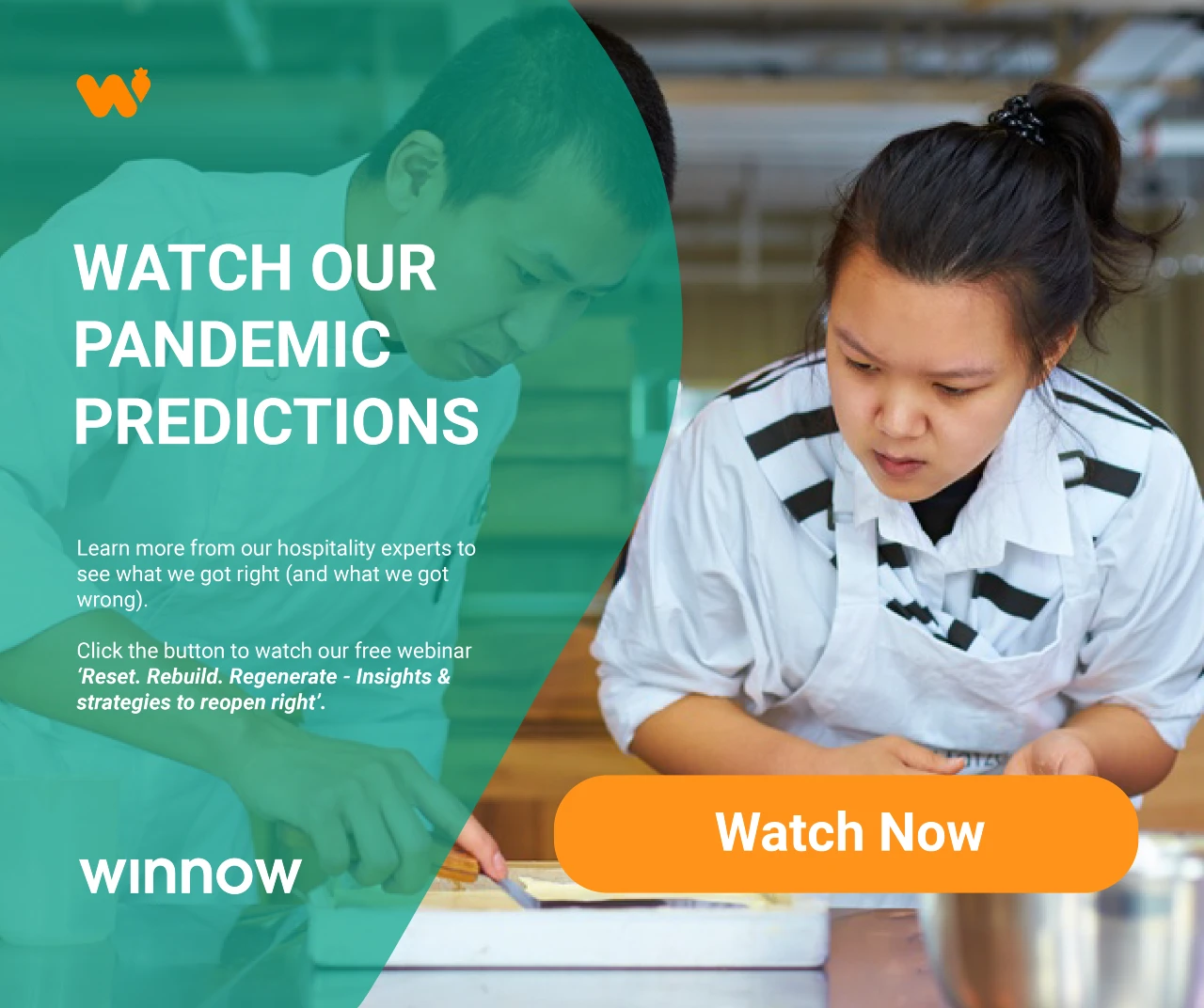During the pandemic, restaurants had to adjust how they operated. Whether they closed down, took takeaway orders, or adopted a hybrid approach, their business models were forced to change.
The pandemic also saw a significant increase in the amount of food wasted as a result of this. Our experts found that levels of food waste reported by restaurants were 50% higher after lockdowns than before the pandemic.
We sat down with food service experts to discuss the changes they were making to their business model to ensure their hospitality venue or restaurant function during the pandemic, and what they were going to carry forward in the future.
Here are our top 4 lessons, taken from our webinar ‘Reset. Rebuild. Regenerate - Insights & strategies to reopen right’, to learn what restaurants can take away from the pandemic and bring into your business model.
Find out what our experts got right (or wrong) about their restaurant in the pandemic. Watch our free webinar for invaluable advice.
1. Don't be afraid of change
Whether it’s for the health and safety of your customers, to minimise waste, or to make the overall customer experience better - don’t be afraid to make changes.
The lessons that restaurants learnt in the pandemic, however, were not just alterations to the front of house model. Changes implemented were throughout the entire restaurant such as:
- Minimising wasteful food presentation. One of the measures Nigel Moore, Senior VP at Accor, took was to eliminate buffets throughout their restaurants during the pandemic. Not only did this allow them to implement health & safety measures within their establishments, but minimise significant food waste.
- Learning how to use food differently. While some elements of wastage are predictable, in order to make the most out of your ingredients, businesses need to think about what they’re throwing away in the kitchen. For example, restaurants in the pandemic realised that they were experiencing a significant amount of good food being wasted as trimmings that could have been used elsewhere.
- Introducing technology into the kitchen. AI or tracking technology implemented in kitchens and restaurants in the pandemic helped businesses gain more insight into which items of food was being wasted or spoilt, indicating what their customers actually wanted. Going forward, this has helped businesses implement menu changes.
Ultimately, restaurants have found customers are more likely to adapt to change since the pandemic. They’re more conscious of their global impact and, as a result, more receptive to changes.
2. Your consumers are more conscious
Ruby O, Director of Environmental, Social & Governance for Wynn Resorts Macau explained that food services and restaurants in the pandemic were finding that the consumer is more environmentally aware than ever before.
While consumer consciousness affects a significant amount of industries, such as fashion, cosmetics and transportation, awareness and expectations of the food industry have shifted as a result.
Customers not only expect you to be environmentally conscious but expect restaurants in and out of the pandemic to:
- Have environmental policies.
- Be making ethical choices.
- Be doing things for sustainable reasons, not profit.
While this is true, Ruby O noted that people still expect the same lavish experience as before. Although people want to make ethical choices, they still want the same, or better, experience at your establishment.
Ultimately, any shift in expectations and experience for hospitality and restaurant in the pandemic had to be communicated to the consumer. If customers are aware of the changes you’re making for ethical or sustainable reasons, they’re more likely to be receptive and accept the adjustment.
See what other predictions our experts made about foodservice and restaurants in the pandemic by watching our free webinar.
3. Communication is key
As previously mentioned, restaurants found that communicating with customers and explaining what changes or processes were happening made them more receptive to change. Not only should you communicate how they have changed, but, most importantly, why.
Nigel Moore gave practical advice his hotel and restaurant took in the pandemic to prepare customers’ expectations, such as:
- Emailing out any changes before guests’ arrive.
- Displaying videos on guests’ rooms with new restaurant expectations.
- Staff explaining new processes as they arrive, such as using QR codes.
Ultimately, you need to manage customer expectations before they enter the restaurant and prepare them for the new processes in place. Whether these are for health & safety reasons or sustainability issues, your consumers will be more receptive to these changes if notified before they arrive.
4. Become a pillar of your community
As the consumer is more environmentally aware and is wanting to make more sustainable choices, Ruby O explained that it is vital to become a pillar of your community.
In order to help those in crisis during the pandemic, Wynn Resorts Macau teamed up with local food banks to give food to those in need and started working with local farmers and produce providers. Not only did this help with their overall brand image, but helped their team realise the impact and importance of the food they use.
By following the produce through their local community from the provider, transporter to chef, this then leads to natural questions such as, if there is any wastage, ‘who needs this food?’
Going forward it's crucial your business considers the overall lifecycle of your food and how you can give back to your community. This includes, but is not limited to:
- Using local produce suppliers where possible.
- Working with local food banks to give back to your community.
- Signing up for food waste reduction services - such as Too Good to Go.
Learn more tips from our experts in ‘Reset. Rebuild. Regenerate - Insights & strategies to reopen right’.
Taking environmental action from your restaurant
To do everything restaurants in the pandemic learnt and mentioned here, your business needs the right level of planning and preparation in place to do them right.
Not only for the opening (or re-opening) of your business, but any other crisis-management preparation. It is vital for businesses to ask themselves:
- What can you do for your kitchen?
- How can you ensure the consumer is satisfied along with the impact on your local community?
- How can you communicate these changes to your customers?
While there was only so much restaurants could predict during the pandemic, there is still a lot to learn from the past and present. By looking back at what we got right and wrong during those unprecedented times, this will help you to future-proof your business and make sustainable choices today.









Comment on my blog